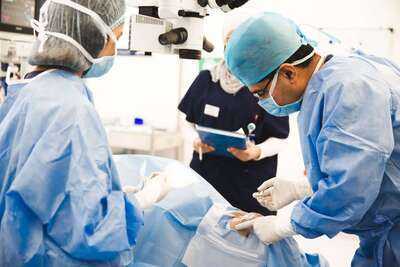
For the last 30 years, Hanaa Mahdi Saleh Ali lived in a world without a clear vision. She had lost all hope to see again — until she flew to the UAE to get her eyes checked at an eye hospital in Abu Dhabi.
“I couldn’t even imagine a life where I could see again,” said Hanaa, who was born in Yemen. She lost her sight when she was only 10 years old.
Despite her father’s efforts to seek help from numerous worldwide, she was consistently diagnosed with vision loss caused by night blindness and . All she could see were blurred lights as she struggled with daily tasks that many people took for granted.
Hanaa was repeatedly told she would never see again. It turned out there was hope.
In 2024, her sister, who lives in the UAE, learned about the technology being used at Moorfields Eye Hospital in Abu Dhabi to perform innovative treatments. She urged Hanaa to consider the possibility of restoring her sight there.
Upon arriving in Abu Dhabi, Hanaa consulted with Dr Syed M Asad Ali, a consultant ophthalmologist at Moorfields Eye Hospital.
After a thorough examination, Hanaa was diagnosed with gyrate atrophy, a rare genetic condition, along with advanced cataracts and cystoid macular edema. It was a complex case, but a ray of hope for Hanaa.
“Losing my vision at such a young age meant missing out on the simple joys of life, playing outside, reading, even eating normally. But after hearing about the hospital, I began to believe that maybe, just maybe, there was a way to restore my vision," she said.
Gyrate atrophy, the condition Hanaa suffered from, is a rare genetic disorder that causes a buildup of a substance called ornithine. It is diagnosed through medical history, eye examination, genetic testing, and retinal imaging. The surgery to remove Hanaa’s cataracts using ultrasound required careful planning, precise execution, and clear communication of the associated risks.
In November 2024, Dr Asad Ali performed successful surgeries on both of Hanaa's eyes, restoring her vision after 30 years of blindness. “At our hospital, we leverage the legacy and expertise of our London counterpart to offer advanced treatments and services across the UAE,” the specialist said.
“Hanaa was initially diagnosed with retinitis pigmentosa and congenital cataracts, but we later identified the correct issue as gyrate atrophy with advanced cataracts and cystoid macular edema. Both conditions can lead to peripheral vision loss or changes in the retina,” said Dr Asad Ali.
Hanaa couldn't thank the Abu Dhabi doctors enough for the "biggest blessing" she has received: To be able to see her family's faces again.
“It has been 30 years since I last saw clearly. Though it’s been a long time, I still vividly remember everything, my family's faces, the sky, the trees, and the sea," she said.
Since she got her sight back, she started appreciating every little thing in life, she added. "The joy of reconnecting with the world visually is indescribable.”
“All the doctors and staff at the hospital, including Dr Esmaeil Mohammad Arbabi, were incredibly supportive. I thank them every day in my prayers for their efforts,” said Hanaa.
Dr Asad Ali expressed his pride in the success of the surgery. “This case highlights the transformative potential of advanced ophthalmological care. We are thrilled with Hanaa’s progress, and she is now continuing her aftercare in her home country, where we remain in contact to ensure her long-term well-being,” he said.